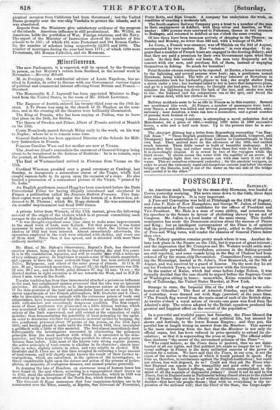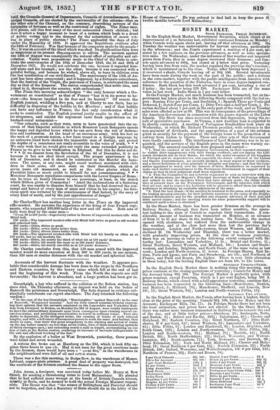In a powerful and truthful paper, last Saturday, the Times
likened the state of France, deprived of liberty and political life, but amused by shows and festivals, to the lower Roman Empire ; and thus put, the parallel has at length wrung an answer from the Noniteur. This answer is the more interesting from the fact that the lifoniieur is not only the official organ, but has been reduced in price specially to extend its cir- culation • so that it is superseding the press at large. The official editor thus discloses "the secret of the envenomed polemic of the Times" —
" Who could believe, as the Times dares to pretend, that we are disin- herited of all our rights, and that political life exists no longer for us ? Uni- versal suffrage in France is the most unlimited exercise of the power of i
election for a nation. We have said that the Times, in our eyes, s not the organ of the nation in the name of which it would pretend to speak. Far from us, therefore, tarecriminate against the English institutions; but could not others, less well disposed, do so ? Could not they ask the Times whe- ther England can oppose to the tranquillity and good order of our uni- versal suffrage its limited suffrage, and its elections accomplished in the midst of all the scandals of disgraceful jobbery ? Could it not be said to the Times, that in England seats in Parliament belong almost always to the richest —that in France they are free to all without distinction ; that there fortune decides—that here the people choose ; that with us everything is the ex- pression of the national will; that the Chief of the State, the Corps-Legis- Iatif, the Councils-General of Departments, Councils of Arrondissement, Mu- nicipal Councils, all are elected by the universality of the citizens—that on the other side of the Channel, on the contrary, everything savours of the inequality of fortunes as well as the restriction of rights. The Times may, if it please, call thie first essay of the most unbounded liberty childish ; but does it select a happy moment to boast of a system which leads to a dread of public voting and to the demand for the substitution of secret vot- ing in place of public election ? The Times applauded the days of July under the Monarchy of 1830. It approved the Republican ovations after the 24th of February. Was that because of the conquests made by the people ? No; it was on account of the blood which was shed. Its glorifications then were as suspicious as its present disparagement is odious. The sarcasm against the loth of August was consequently the natural effect of antipathy and cal- culation. Vainly were propositions made to the Chief of the State to cele- brate the anniversaries of the 10th of December 1848, the 2d and 20th of December 1851. He would not celebrate the one, because it regarded him- self alone and his triumph ; nor the other, because it was connected with a painful feeling, and because he wished, above all, to bury in oblivion even the last recollection of our civil discord. The anniversary of the 15th of Au- gust has been alone consecrated ; and it happened, by a fortunate coincidence, that the festival of the Virgin, the patroness of France, is celebrated the same day as that of the Emperor. The nation comprehended that noble idea, and joined in it, throughout the country, with enthusiasm." The Times this morning acknowledges "the only honour which a Go- vernment so constituted" as that of France "has it in its power to be- stow—the honour implied in its fear and its hatred." Of course the English journal, wielding a free pen, and at liberty to use facts, has no difficulty in disposing of the babble in the Moniteur ; and if that babble can have any influence in Feance, the fact only corroborates *hat it seeks to contradict. .The English journal justly exults in the effect of its eloquence, and amidst the argument casts fresh opprobrium on its bastard-royal. antagonist- " Our remarks, such as they were, seem to have penetrated into the re- cesses of that Imperial solitude in which Monsieur Louie Bonaparte spends the happy and dignified hours which he can save from the toil of destruc- tion and confiscation. At the head of an enormous army, with his foot on the neck of a prostrate nation, a few lines traged in a foreign language by an unknown hand have shaken the impassible man of destiny, and probed the depths of a conscience not easily accessible to the voice of truth. • • * We only wish that he would give our reply the same extended publicity in France as we give to his vindication in England. But this he dares not do. • * * If we dissent from the Revolution of the 25 of December, it is not because it has not shed blood enough. The proper anniversary is the 4th of December, and it should be celebrated at the Marche des 'alio- cens. The name, at any rate, might recall mothers murdered with chil- dren in their arms, old men slain on their thresholds, children of seven years old massacred, as well as the other glories which the President takes so much credit to himself for not commemorating. * • • Monsieur Bonaparte repudiates comparisons with the Lower Empire of Rome : can he trace no family likeness to one personage, at least, in the sketch which Gibbon gives- of Commodns ? Amid the acclamations of a flattering court, he was unable to disguise from himself that he had deserved the con- tempt and and hatred of every man of sense and virtue in his empire ; his fero- cious spirit was irritated by the consciousness of that hatred, by the envy of every kind of merit, and by the just apprehension of danger.' "



























 Previous page
Previous page